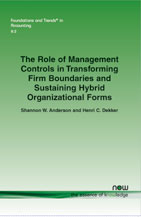The Role of Management Controls in Transforming Firm Boundaries and Sustaining Hybrid Organizational Forms
Shannon W. Anderson, University of California Davis, Graduate School of Management, USA, swanderson@ucdavis.edu , Henri C. Dekker, VU University, The Netherlands, h.c.dekker@vu.nlAbstract
Coase [1937] first explained the existence of firms and the boundaries between them as an emergent solution to minimizing the costs of accessing markets – what Williamson [1975] later termed 'transaction costs.' Over time, innovations in management control and changes to legal structures have reduced the costs of monitoring, raised the costs of behaving opportunistically, and created ways for partners to commit credibly to future actions. At the same time, entrepreneurial firms have developed inimitable resources that are a basis for collaborating with partners who have complementary resources Penrose [1959]. Together these forces have transformed the dichotomous choice of 'make' versus 'buy' into a selection among a more nuanced set of hybrid modes of organization (e.g., strategic alliances, joint ventures, and supply chain partnerships). The hybrid structures blend characteristics of arms-length market transactions with modes of governance and control that are more common to large decentralized firms. The thesis of this monograph is that innovation in management control has been central to the emergence, diversity and stability of hybrid organizational forms. Extending the arguments of Coase, Williamson, and Penrose, a review of the accounting literature highlights the important role that management controls have played in transforming the question from explaining firm boundaries to explaining how transactions that appear to be fraught with transactions hazards are rendered profitable and sustainable to transaction partners. We review empirical research in management accounting to support our thesis and identify areas for further inquiry.
The Role of Management Controls in Transforming Firm Boundaries and Sustaining Hybrid Organizational Forms
The Role of Management Controls in Transforming Firm Boundaries and Sustaining Hybrid Organizational Forms aims to demonstrate how controls have been used to mitigate risk and to facilitate collaboration in inter-firm transactions. The authors aim to highlight the central themes and identify emergent research streams that offer promise for advancing our understanding of inter-firm management controls. The monograph considers two streams of empirical management accounting research that are distinguished by their focus and typical research methods & one stream of research focuses on the determinants of investments in contracts and other management controls while the other stream focuses on how the stability of hybrid forms is affected by individual managers who both negotiate and manage inter-firm transactions under the influence of management controls. The thesis of this study is that inter-firm management control is central to generating the returns to hybrid organizational forms.
Following an introduction, the authors examine how contracts are used to control opportunistic hazards and to facilitate coordination in inter-firm transactions. The next section moves beyond the formal contract to consider other mechanisms of control that are employed to mitigate risk and sustain hybrid organizational forms. Sections 2 and 3 focus on the contingent relationship between transaction risks and management controls and are premised on firms maximizing long-run profits using a combination of revenue maximization and cost minimization. Section 4 reviews an emergent stream of behavioral research that investigates how individual managers, who negotiate and transact on behalf of firms, influence and are influenced by management controls. The authors conclude in Section 5 with a discussion of directions for future research.
